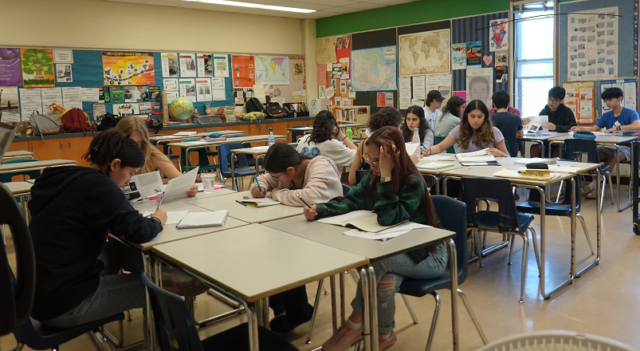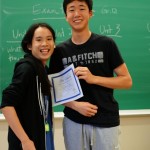Category: CHY 4U
Indigenous Education Week (Nov 1-5)
Ever since my whole school live Zoom presentation on September 30, the first annual National Day for Truth and Reconciliation, I have said that I wanted to continue the conversation.
I have not lived up to that as well as I wanted. I’m working on it.
One thing I’d like to share is the “Save the Evidence” campaign from the Woodland Cultural Centre, home to the former Mohawk Institute Indian Residential School.
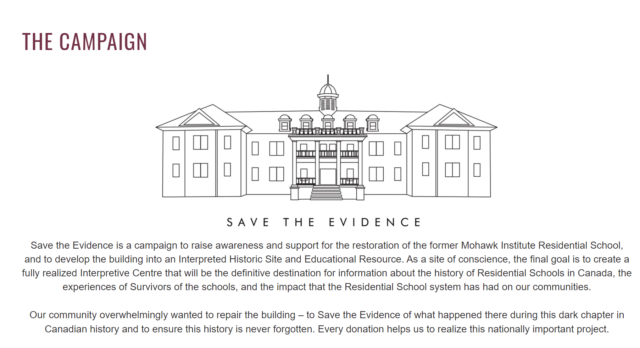
We know as historians how important primary source evidence is. That’s what the school building represents. People need to see it to appreciate its significance in the history of residential schools that Canadians are learning more about.
When I first drove up that driveway and saw that imposing colonial-style building, I felt uneasy. After learning more about the place known sadly known to students as the “mush hole”, I felt pretty sick. There is nothing child-friendly about it.
When our group visited Woodland Cultural Centre, we had the privilege of hearing survivor Geronimo Henry speak about his 11-year ordeal at the Mohawk Institute. He had a number of items with him – primary sources – including this letter that his mother sent the school to enroll him in 1942. Please note that Geronimo gave permission for me to take this photo.
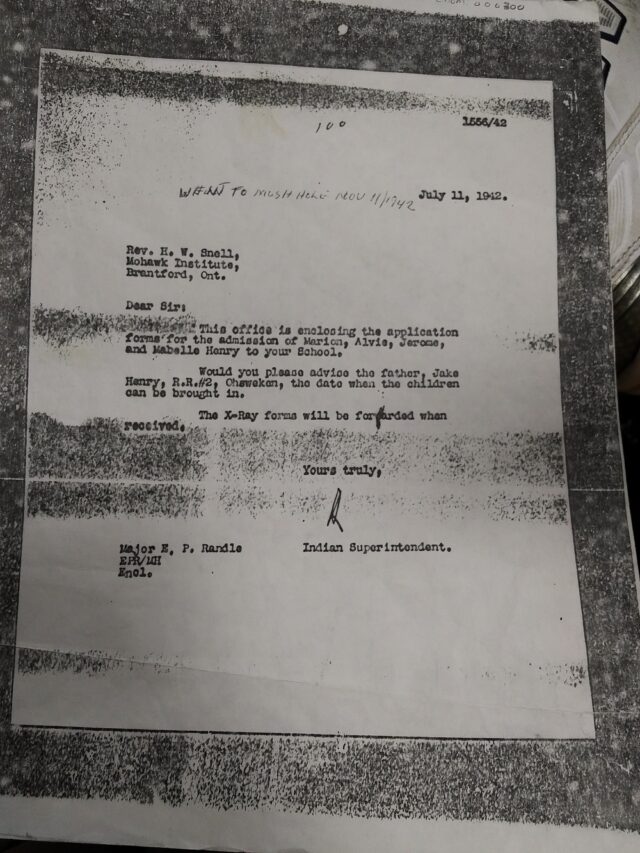
We must always remember that history is about real people. Geronimo Henry, now in his 80s, speaks passionately about his experiences to educate the public about the impacts of residential schools.
Watch this short clip from Sept. 30 at the Mohawk Institute.
We must all keep learning and speaking out.
Course Fair – History Courses at YM 2024-25
If you are interested in taking history at York Mills, you have come to the right place. History is a very valuable subject. It’s not about memorizing factoids and dates. It’s about thinking, interpreting, discussing, inquiring. The skills you gain in senior history courses will help you with any education path you choose. You will always need to THINK!
Grade 10 history (CHC2D), Canada Since 1914, is a mandatory course. It explores events and themes in our country’s history since World World War One. This course is also offered for French Immersion students (CHC2D5).
In grade 11, you can choose between American History (CHA3U) or World History (CHW3M) to the 16th Century. Speak to Mr. Chang about American History.
You can search on this website (Ms. Gluskin’s blog) under the CHW3M tab to see what the course is like. And, read on.
Here are some materials for you to decide if grade 11 World History (ancient civilizations) is for you:
Grade 12 World History starts in 1450, where the grade 11 course finishes. However, grade 11 history is not a prerequisite for grade 12 history.
You can search this website (Ms. G’s blog) under the CHY4U tab to see what this interesting course is like.
Here’s what two of Ms. Gluskin’s former students have to say about taking World History at YM (by the way, one is about to become a lawyer and the other is a business consultant):
If you would like to ask questions to Ms. Gluskin about World History at YM, please feel free to email (risa.gluskin@tdsb.on.ca) as she is on leave this year.
See you at Course Fair on Friday February 9, 2024 in room 145.
Don’t forget about all of YM’s senior (gr 11 + 12) courses in the Canadian and World Studies and Social Sciences and Humanities.
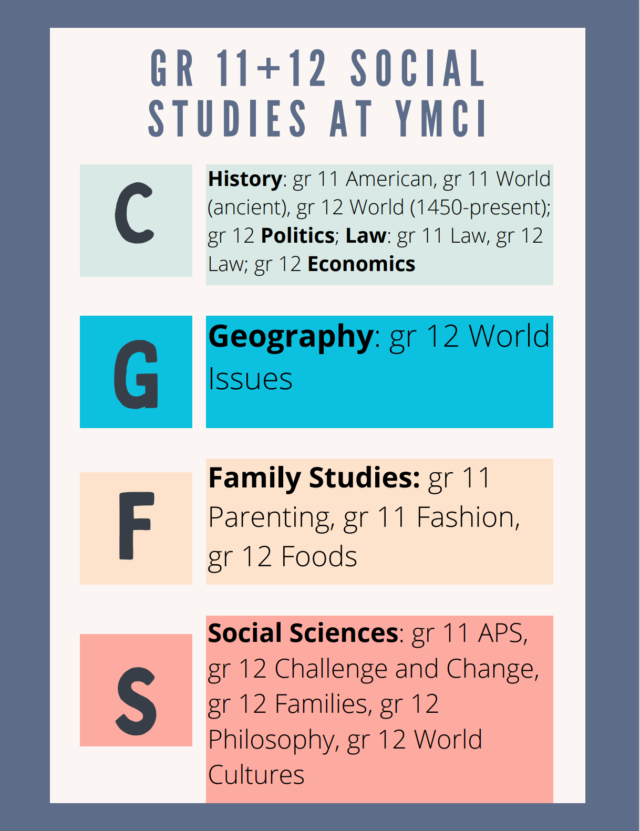
Virtual Field Trip
It’s not a good idea to go in person right now, but please check out the Legacy Museum: From Enslavement to Mass Incarceration in Montgomery, Alabama.
Equal Justice Initiative, founded by lawyer Bryan Stevenson, whom you may have heard of from the documentary “True Justice” or the movie “Just Mercy” based on his 2014 memoir, has created this museum dedicated to educating people about how the remnants of slavery can be seen in the violence of lynching, segregation and mass imprisonment.
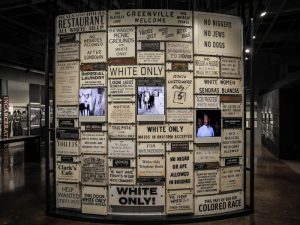
‘Segregation posters are on display at the Legacy Museum in Montgomery, Ala. “The great evil of American slavery wasn’t involuntary servitude,” Stevenson says. “It was this idea, this narrative, that black people aren’t as good as white people.”‘ (Source: https://www.npr.org/2020/01/20/796234496/just-mercy-attorney-asks-u-s-to-reckon-with-its-racist-past-and-present)
There’s also the National Memorial for Peace and Justice, America’s first memorial to the thousands of lynching victims throughout its history.
Take Grade 12 History Next Year
What do we do in grade 12 history? Check out this video. And see you at Course Fair in February.
Welcome New Students
Hello everyone! Welcome to my CHY4U class, whether you’re a new student, or familiar with me. I’m really looking forward to a good semester; this will be my second time around with my revised version of grade 12 World History. It’s very different from grade 11 – be prepared for a very different style. If you’re new, the course will hopefully make you realize the incredible horizons of history!
First Activity
If you scroll through my blog you’ll notice that I like to write book reviews. I would like you to write either a book review, a movie review, a documentary review, a YouTube review, a website review, or a tv show review. The one catch is that it has to have something to do with HISTORY! Any time period, not necessarily just 1450-present (the time frame for CHY4U).
Also, please reveal something of yourself in your review: what do you like when it comes to history and reading/viewing? What makes it appealing (or not) to you? What did it make you think about? What did you learn from it?
Length: a good paragraph at least – it doesn’t have to be as long as some of my reviews.
Send It To Me
My email is risa@cabal.org or risa.gluskin@tdsb.on.ca. Please send your review by Friday Sept. 8.
Last Days of School June 2017
Here are some photos from the last few days of school. Thanks for a great semester!
- Exec and Ms. P
- StuCo last day - Conroy and Hana
- Conroy and Joon Ho
- Some girls of CHW3M
- Caitlyn and Anmol
- CHY4U - awesome class
- Exec and Ms. G
- CHY4U outside
- Richard and his blanket - honorary members of YM!
- Grace and Varnikaa
- Liam and Nic
Welcome, Students
Hello everyone, welcome to my class, whether you’re in CHW3M or CHY4U, a new student, or familiar with my ways. I’m really looking forward to a good semester: Lots of thinking and exploring. Normally, I’d have students write a profile of themselves. I’m dispensing with that in favour of something new. We’ll see how it goes – it’s okay to experiment.
New Intro to You
I’d like you to go through my blog and find something you can identify with (search the lists of recent posts and archives on the right, or just keep scrolling down and hitting ‘older’) for a post that you like, a book review of a book that sounds good, a pic of a class, whatever. Just send me a comment on that post and tell me why you like it, or what it makes you think about, or what you’re hoping for in this class. I’ll leave it open ended. Just make sure it’s more than a couple of sentences – let’s put some thought into this, please.
Or, If You Don’t Like That Idea
If that’s not to your taste, write me a short email telling me which historical time period you think you would have liked to live in. My email is risa@cabal.org or risa.gluskin@tdsb.on.ca
My answer is below.
Ms. G: My Time
Believe it or not, I have given a great deal of thought to this question: if I had to live in another time period, which would it be? The catch is that I’d have to be of the time period, I couldn’t be presentist about it and say that I wouldn’t have liked to live in Tudor England because the technology was so low. I wouldn’t have known about Netflix and email at that time. So I couldn’t have missed it.
Though the technology would be different, another catch is that my personality would be similar to the way it is now. I’m not a very social person, I think a lot, I am rather moderate with the occasional radical thought. These things matter when I’m thinking about time periods. I would have been okay in the first phase of the French Revolution, expectant with change! However, in the Terror I wouldn’t have liked the extremism and would definitely have feared the guillotine.
Though I absolutely love studying ancient Egypt, I’m not sure I would have made it in that civilization; I’m an atheist and wouldn’t have had the personality for joining into the state religion. However, if I were an ordinary farmer I might have been just fine doing my thing and living my relatively good life along the banks of the Nile, especially as a woman.
I don’t think I’d have made a good Roman or Greek either. As a woman in ancient Greece, I probably would have had some complaints about how much I contributed to my society but how little I was valued for it. The Roman blood lust just wouldn’t have been acceptable to me. I’d have winced at gladiator shows.
A very appealing possibility is living in Florence or Venice during the Renaissance: so much creative license and artistic expression. Still a lot of religion though.
I guess I have to come to some kind of final decision here. Being who I am, I probably would have done best in the 1960s somewhere like Berkeley or San Francisco. It was a time of change and freedom. Young people were standing up for their beliefs, challenging society to become more progressive. Though I wouldn’t have liked the drug scene, and I for sure would have been VERY anti-war (Vietnam), I would have felt like I belonged in the forward motion of history.
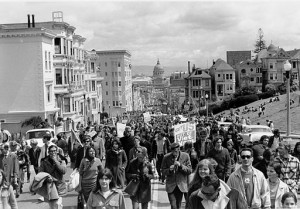
“Anti-Vietnam war demonstrators fill Fulton Street in San Francisco on April 15, 1967. The five-mile march through the city will end with a peace rally at Kezar Stadium. In the background is San Francisco City Hall. (AP Photo)” from Library, University of California, Berkeley, Media Resources Centre, 2012,
http://www.lib.berkeley.edu/MRC/pacificaviet.html (Jan. 31, 2017)
Becoming an Inquiry Teacher
Last year as I taught the new CHW3M and CHY4U courses I set for myself some personal challenges:
- try to implement the curriculum changes as fully as possible.
- try to bring inquiry into each lesson in some way.
I spent a lot of time with the curriculum document – it’s heavy but it’s all marked up now.
I can’t say that I was fully successful, but I’m proud of the efforts I did make. I took a lot of mental notes on what to change next time.
Here are some pointers I’ve developed to help me keep up the challenge and to communicate to other interested people what I am doing. Note: this PPT changes a lot as I add new things and develop my thinking.
The transition is hard but it’s worthwhile.
Becoming an Inquiry Teacher (Nov. 28 update)

